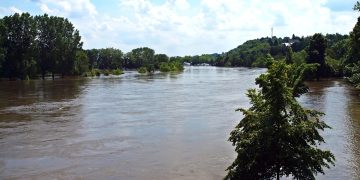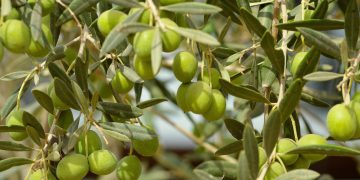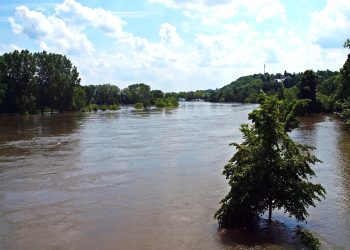In late October, climate change suddenly felt very real in northern Italy. A severe storm brought heavy rainfall to the region, causing Lake Como and the Seveso River to burst their banks. The flooding hit towns and cities including Milan in the latest stark reminder of the area’s vulnerability to extreme weather.
At the Polytechnic University of Milan, Professor Andrea Castelletti is studying the behaviour of water and landscapes. An expert in natural-resources management, he thinks artificial intelligence (AI) may offer much-needed answers as global warming triggers increasingly destructive – and more frequent – storms, floods, heatwaves and droughts.
Potential ally
The October floods in Italy came on the heels of extreme drought in the country only months earlier. Areas of Greece, including the central-eastern port city of Volos, faced a similar one-two punch, with scorching temperatures sparking large wildfires in July and freak storms destroying farmland, livestock, homes, roads, vehicles and other property in September.
‘We’re dramatically facing the accelerated effects of climate change,’ said Castelletti. ‘We need to better mitigate and prepare for these events. AI might help with that.’
AI has grabbed headlines so far for its ever-improving ability to generate text, personalise services and even create art.
But the technology might also be harnessed for the more pressing case of fighting climate change, which is making extreme weather not only more common but also harder to predict. So can AI help with forecasting and could it have predicted the Como flooding?
Extreme weather will feature at this year’s United Nations climate change summit in Dubai, the United Arab Emirates. Known as COP28, the conference will start on 30 November and is due to run until 12 December.
As it seeks to combat global warming, the UN has said people worldwide need adequate warnings of extreme events in order to prepare for them. This is a key objective in a five-year UN plan to improve early-warning systems.
That’s where AI may have a role to play.
Clearer forecasts
Castelletti believes AI could be the ingredient that improves current climate and weather models. Today’s models take large amounts of data and feed them into mathematical formulas to make predictions.
“We’re dramatically facing the accelerated effects of climate change.
For all their number-crunching power, he said the models could be more accurate.
‘They still have weaknesses,’ Castelletti said. ‘AI might solve those.’
Castelletti is leading a research project that received EU funding to combine AI and Europe’s Copernicus satellite network to improve climate forecasting. Called CLINT, the four-year project runs through June 2025.
Researchers from Belgium, France, Italy, Germany, Greece, the Netherlands, Spain, Sweden and the UK are working to determine how AI can add to knowledge about extreme weather.
‘Existing climate models aren’t very good for certain extreme weather events,’ said Professor Dim Coumou, a climatology expert at the University of Amsterdam in the Netherlands. ‘Heatwaves in Europe are, for example, increasing much faster in the real world compared to what the models tell us should happen.’
Coming soon?
The reasons might be changes in the high-altitude air currents – jet streams – that can influence all kinds of weather phenomena, including heatwaves, hurricanes and droughts.
With AI, researchers hope they can better understand the causes of such events and eventually predict them more accurately.
That would mean, for example, more reliable and timely alerts to southern Europeans about dangerously hot summers. It would also serve other parts of the world such as Africa facing increasingly disruptive weather.
In Libya in September, a cyclone brought heavy rains that caused flooding, the collapse of two dams and the deaths of more than 4 000 people in eastern coastal areas including the city of Derna.
‘It’s important to forecast extremes so we can have early warnings,’ Coumou said.
He said that AI would probably be widely introduced into climate models within the next five years.
Castelletti said the trend has already begun, with the European Centre for Medium-Range Weather Forecasts running a series of machine-learning models.
‘I expect we will see an exponential growth in the integration of AI and climate models,’ he said.
Reality check
In current climate modelling, human researchers make formulas in a bid to forecast weather.
“We want to know the driving factors.
By contrast, AI systems take massive amounts of weather data to build a prediction model that autonomously tweaks itself over and over until getting as close to reality as possible.
Coumou leads an EU-funded research project running in parallel with CLINT and, like it, trying to harness AI to improve predictions of extreme weather. Called XAIDA, his four-year initiative runs through August 2025 and involves partners in France, Germany, Spain, Switzerland and the UK.
In contrast to CLINT, the XAIDA team is focusing also on the underlying causes of extreme weather.
Coumou’s main research interest is how global warming is affecting both the number and intensity of extreme weather events.
In addition to his work at the University of Amsterdam’s Institute for Environmental Studies, he works with the Royal Netherlands Meteorological Institute and coordinates a special research group called climateextremes.eu that also involves the Potsdam Institute for Climate Impact Research in Germany.
‘It’s about understanding the role of climate change in events ranging from heat waves to droughts and extreme rainfall,’ said Coumou. ‘We want to know the driving factors.’
Inside look
But to make use of AI, the researchers are grappling with its enormous complexity.
Popular AI systems work by putting data through a vast network of “parameters” – values that algorithms change as they learn. The latest AI model, GPT4, was released earlier this year and has 1.76 trillion parameters.
To explain the outcome, researchers first must figure out what the most important parameters were.
‘AI is very powerful, but it’s a challenge to interpret the results,’ said Coumou.
He and his colleagues are prying open the AI system in an effort to understand which parameters – based on weather information in their case – have a key influence on the result.
Hungry machines
Another obstacle that the researchers face stems from AI’s hunger for data. In sum, AI needs a lot of the stuff to work well.
While the world has plenty of weather-related information, sometimes stretching back centuries, it has a dearth of data on the more recent phenomenon of extreme climate events.
‘Extreme events are, by definition, rare,’ said Castelletti. ‘So you don’t always have many observations. That is a major hindrance if you want to use AI methods.’
CLINT aims to solve that scarcity of numbers through a method called data augmentation. The researchers use AI systems to create data based on historical information. The new information can then be fed into other AI systems to make predictions.
‘In the past few years, people across the world were regularly confronted with extreme weather,’ said Castelletti. ‘At the same time, AI is changing our lives. We need to bridge these worlds and have AI reduce the impact of these extreme events.’
Research in this article was funded by the EU. The views of the interviewees don’t necessarily reflect those of the European Commission. If you liked this article, please consider sharing it on social media.
O artigo foi publicado originalmente em Horizon, the EU Research and Innovation Magazine.





















































